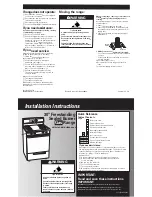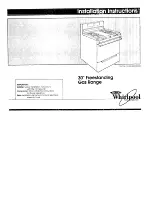
CARE AND MAINTENANCE
CARE AND CLEANING OF THE RANGE
BURNER GRATES
Your range has two or three professional-style double grates. These grates are position-
speci
fi
c. For maximum stability, these grates should only be used in their proper position; they
cannot be interchanged left to right or front to back. For convenience, the undersides of the left
and right grates are marked “LEFT FRONT” and “RIGHT FRONT”. Make sure the front portion
of both grates is in front. The middle grate has a bow in front. Make sure the bowed portion
is toward the front of the range. in addition, the middle grate is supported by the left and right
grates and must be installed LAST for stability.
Cleaning
•
Lift out when cool. Grates should be washed regularly and, of course, after spillovers. Wash them in hot, soapy water
and rinse with clean water. When replacing the grates, be sure they are positioned securely over the burners.
•
Replace the grates so that continuous arcs are formed with the center ribs of all three grates.
•
Do not operate a burner for an extended period of time without cookware on the grate. The
fi
nish on the grate may
chip without cookware to absorb the heat.
•
To get rid of burned-on food, place the grates in a covered container. Add 1/4 cup ammonia and let soak several hours
or ovenight. Wash, rinse well and dry.
•
Although they are durable, the grates will gradually lose their shine, regardless of the best care you can give them.
This is due to their continual exposure to high temperatures. You will notice this sooner with lighter color grates.
• NOTE:
Do not clean the grates in a self-cleaning oven.
STANDARD TWIN BURNER ASSEMBLIES (on some models)
For cleaning information on sealed burners, see section below. Sealed
burner cooktops do not lift up.
•
On models with standard twin burners, the cooktop lifts up for easy access.
•
Turn all contols
OFF
before removing burner parts and rip pans (if so
equipped).
•
The burner grates and drip pans can be lifted off, making them easy to
clean.
•
The holes in the surface burners of your range must be kept clean at all
times for proper ignition and an even, unhampered
fl
ame.
•
You should clean the surface burners routinely, especially after bad spill-
overs, which could clog these holes.
•
Wipe off surface burners. If heavy spillover occurs, remove the surface
burners from the range. Burners lift out for cleaning. Lift up the cooktop and
then lift out the surface burners.
•
To remover burned-on food, soak the surface burner in a solution of mild liq-
uid detergent and hot water. Soak the surface burner for 20 to 30 minutes.
•
For more stubborn stains, use a cleanser. Rinse well to remove any traces
of the cleanser that might clog the surface burner openings.
•
Do not use steel wool because it will clog the surface burner openings and
scratch the surface burners. if the holes become clogged, clean them with a
sewing needle or twist-tie.
•
Before putting the surface burner back, shake out excess water and then
dry it thoroughly by setting it in a warm oven for 30 minutes. Then place it
back in the range, making sure it is properly seated and level.
• Check
the
fl
ame pattern of each burner. If the
fl
ames are “jumpy” (not
steady), clean the holes again with a sewing needle or twist-tie.
Clean these holes thoroughly on each side.
Do not operate the cooktop without all
burner parts, drip pans (if so equipped)
and grates in place.
CAUTION
15
















































